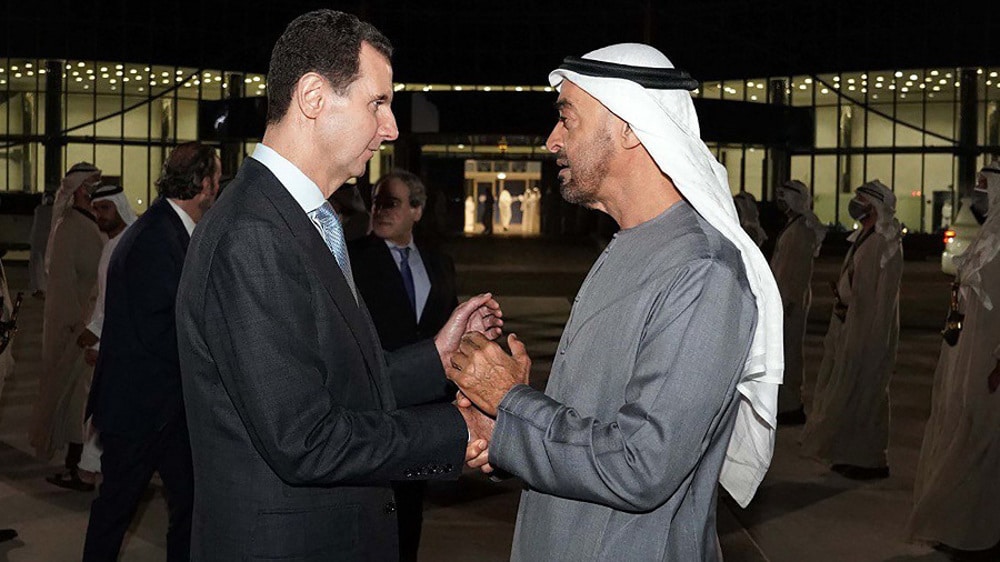Analysts: Assad’s Visit to UAE Positive Despite US Opposition


Orinoco Tribune – News and opinion pieces about Venezuela and beyond
From Venezuela and made by Venezuelan Chavistas

Analysts believe a recent visit by Syrian President Bashar al-Assad to the United Arab Emirates was a step forward despite the United States’ bitter reaction to the trip.
Assad’s Friday visit to the UAE was his first visit to an Arab state since the beginning of foreign-backed militancy in his country in 2011.
The Syrian president met with Abu Dhabi Crown Prince Mohammed bin Zayed Al Nahyan and UAE Vice President and Prime Minister Mohammed bin Rashid Al Maktoum, among other senior Emirati officials.
The trip was the latest sign of warming ties between the two countries after the UAE reopened its embassy in Damascus in 2018 and sent its foreign minister to visit Syria in late 2021.
Washington-based Persian Gulf analyst Theodore Karasik told Voice of America (VOA) that “Assad’s visit to the UAE has been in the works for a long time,” but that its timing has some relation to Russia’s military operation in Ukraine and a possible restoration of the 2015 Iran nuclear deal.
RELATED CONTENT: The Middle East and the War in Ukraine
Karasik further said that the UAE’s decision to host Assad reflects its “unhappiness” with the current US policy and bilateral relations, prompting the Emirates “to take matters into their own hands.”
Meanwhile, Khattar Abou Diab, who teaches political science at the University of Paris, told VOA that Egypt, Bahrain, Kuwait, Oman and Algeria are also leaning toward renewing ties with the Assad government.
Additionally, Hussam Shuaib, a Syrian political expert, told China’s Xinhua news agency that the UAE provides Syria the gateway back to the Arab League and its role in the Arab world.
“It’s without a doubt that the political significance of this visit would reflect positively not only on bilateral ties but on the Syrian-Arab relations in general,” he said.
The visit, he added, also implies trade opportunities from the Arab world for Syria to counter Western economic sanctions.
“As a result of the economic situation and ongoing conflicts, Syria … also needs cooperation on the economic level, and there should be coordination and reopening as well for bilateral trade in goods,” Shuaib asserted.
The UAE itself is interested in thawing ties with Syria “because the UAE needs to get rid of the Yemeni quagmire, and so is Saudi Arabia. Both apparently want to rearrange political relations with Iran, to which Syria is a close ally.”
The remarks came after US State Department spokesman Ned Price said in a statement that Assad’s visit to the UAE left Washington “profoundly disappointed,” urging allies to avoid normalizing ties with Damascus.
RELATED CONTENT: NATO White Helmets Follow Al-Qaeda to Ukraine
“America today is not at its best in front of new changes in the world,” said Shuaib, noting that Price’s comments reflect a “state of disappointment” by Washington about the positive change in the Arab attitude toward Syria.
“If we follow the American policy over all the past decades, we will see that it is based externally on creating chaos in the world and stirring sectarian, religious, and ethnic conflicts,” he emphasized.
Similarly, Emad Salem, a political expert, said Assad’s visit comes at the right time and will restore the Arab unity despite the US dissatisfaction with the change.
“The Persian Gulf countries, especially Saudi Arabia and the UAE, have begun to look at the future of relations with Washington, and relations with other countries of the world from the perspective of their interests,” he added.
In a post on his Twitter account, Thierry Mariani, a French Member of the European Parliament, said after the victory of President Assad in the war, more countries have restored ties with Syria.
If France wants to preserve its role in this region, it must do the same, he stated. This will be a path to a better fight against terrorism and will help the return of refugees.
Featured image: Syria’s President Bashar al-Assad (left) being greeted by Abu Dhabi Crown Prince Mohammed bin Zayed Al Nahyan (right), in Abu Dhabi, March 18, 2022. Photo: Presidency of Syria handout
(PressTV)